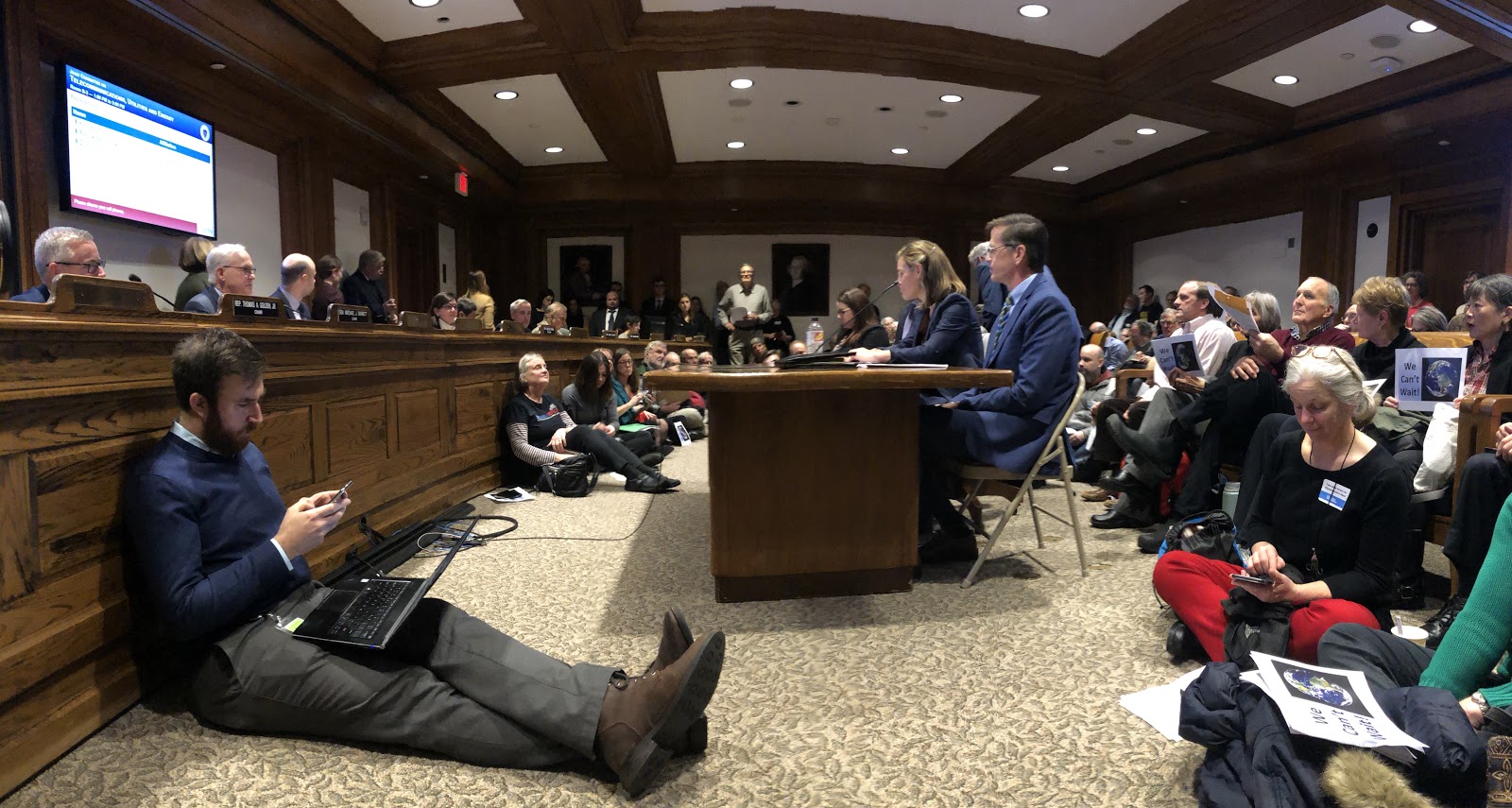Over 225 citizens, business leaders, and elected officials from across the state packed a Beacon Hill hearing room on Tuesday in Massachusetts to show their support for legislation to put a price on carbon pollution. The hearing was held by the co-chairs of the Joint Committee on Telecommunications, Utilities and Energy (TUE), Senate Assistant Majority Leader Michael Barrett and Representative Thomas Golden. For almost three hours the hearing was standing room only, with some 70 additional people left outside.
Political Context
Currently, more than 60% of state lawmakers in the House and Senate (representing a supermajority of Democrats in both chambers) support the two carbon pricing bills before the committee (H.2810 and S.1924). The hearing also served as an opportunity to hear from the Governor’s chief climate and energy officials who started the event off with an overview of their latest Emissions Report, as well as an update on the Transportation and Climate Initiative (TCI). The regional carbon market, focussed on transportation emissions, is set to be finalized in 2020. You can read more about Governor Baker’s announcement and regional support for carbon market policies here.
The hearing offered a chance for the state’s carbon pricing coalition to inform and push for a number of legislative efforts, including a forthcoming climate bill expected to be released by the Senate by the end of January. The Senate, which successfully passed carbon pricing in the last session, looks to build off of previous language and offer a comprehensive legislation package later this month. Ahead of the hearing, there was a surge of unprecedented support for the policy — which has been introduced in the legislature for the third session in a row. Each session, the bill gained more momentum in the media and support from among rank-and-file lawmakers.
Support Grows for Carbon Pricing
The successful hearing comes on the heels of an announcement last week that more than 150 business leaders from 57 communities across Massachusetts, which employ over 4,000 people in state, called on lawmakers to pass a climate bill by July 2020 [read the full list of business supporters here].
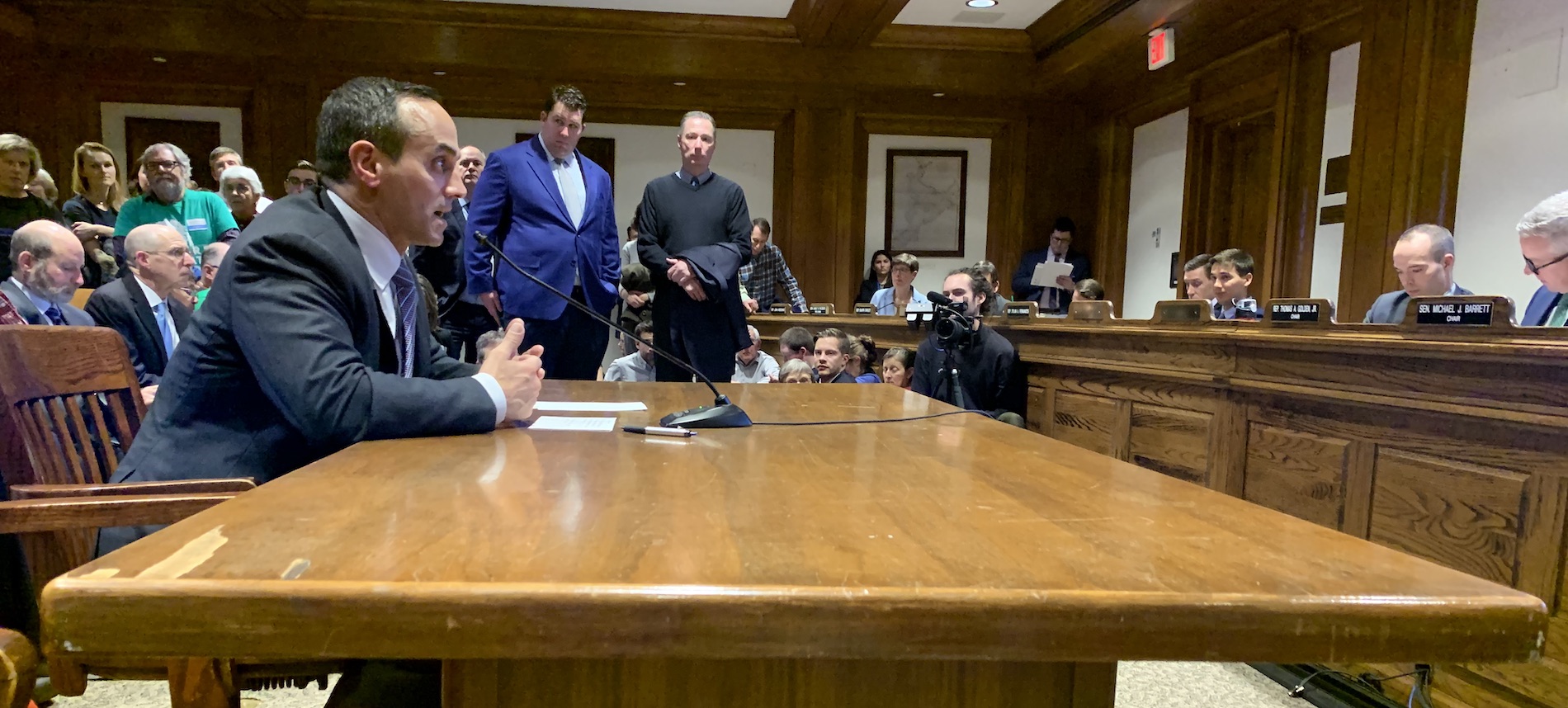
Mayors and other municipal leaders across the Bay State also called for state legislators to move carbon pricing across the finish line this session. Mayor Joseph Curtatone of Somerville testified at yesterday’s hearing, urging the state to take the necessary steps to implement a serious, effective carbon pricing policy, stating, “we need to make sure that climate action and equity are not mutually exclusive.”
The climate crisis is already affecting municipalities and cities around the country and the world. The increasing frequency and intensity of storms, flooding, drought, and damage to the built environment are among the threats facing our cities and towns today, which has put an expanding strain on operations and budgets. Mayors, therefore, are seeking solutions that can not only mitigate future impacts from this crisis, but also provide funding that can be used to address these costs and help cities transition towards the clean economy of the future.
Mayor Ruthanne Fuller of Newton, Mayor Alex Morse of Holyoke, Mayor Kim Driscoll of Salem, Mayor Sumbul Siddiqui of Cambridge, Mayor Nicole LaChapelle of Easthampton, Mayor Donna Holaday of Newburyport, and Mayor David J. Narkewicz of Northampton, all also signed on to a letter in support of carbon pricing in the state (the letter has yet to be formally released).
Furthermore, a massive interfaith community in Massachusetts is supporting carbon pricing as their prefered solution to the climate crisis. Currently over 300 local faith leaders have signed a letter of support for the policy, hailing from diverse range of religions. [Read the full list of supporters here].
Testimony
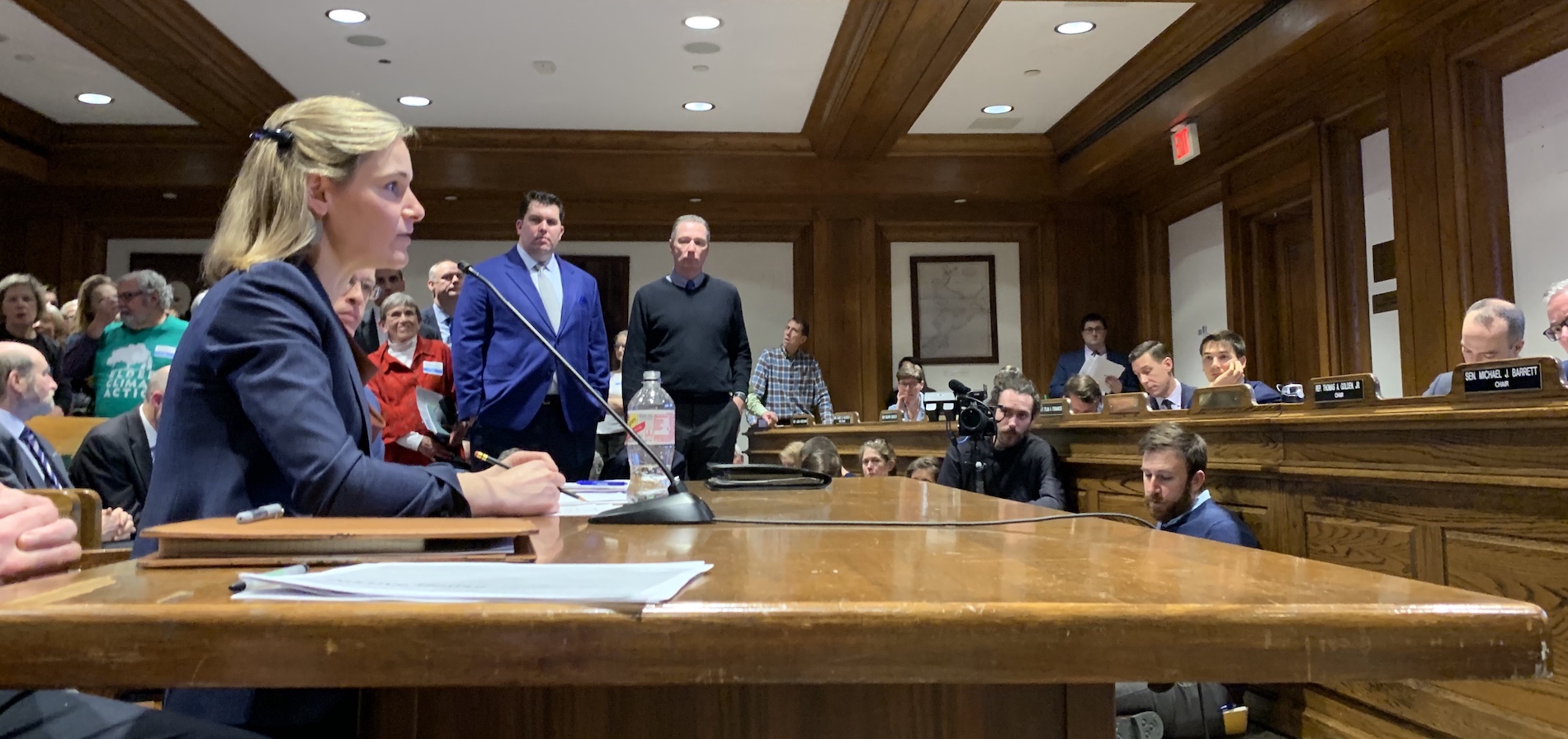
Kathleen A. Theoharides, Secretary of the Executive Office of Energy and Environmental Affairs, was the first to testify. She focused on an array of policies, while acknowledging that TCI remained the “centerpiece” of Governor Baker’s plan to reduce emissions from transportation and to meet carbon reduction requirements. When asked about recent doubts about the policy being able to move forward in the face of uncertainty from governors in the region, she assured lawmakers that her office remained committed to “getting TCI done.”
A number of legislators were also present to support carbon pricing, with many having to wait until the crowds died down to even get into the hearing room. Representative Bill Driscoll (D-Milton), the lead for the House carbon pricing bill, was joined by Representative Paul Tucker (D-Salem) to urge his colleagues to vote on carbon pricing in the current session
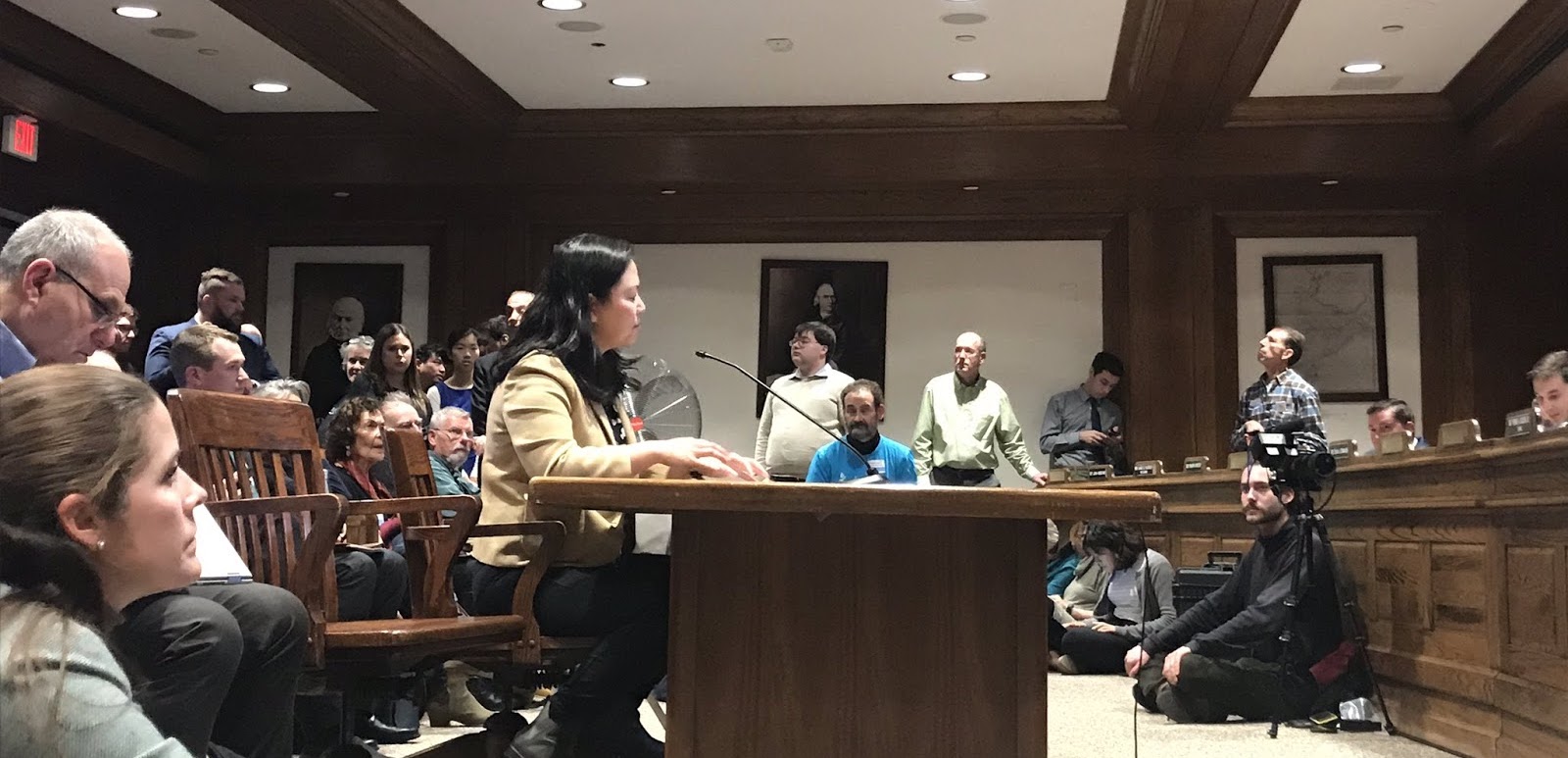
Representative Maria Robinson, a first-year lawmaker and an energy policy expert, hit the nail on the head when she testified that, “we are already paying a carbon price, we just aren’t paying for decarbonization.”
The carbon pricing bills at yesterday’s hearing are supported by the Massachusetts Campaign for a Clean Energy Future, a coalition of 33 organizations from across Massachusetts. The diverse group represents everyone from business leaders to faith leaders to transportation advocates to environmental justice communities.
Over the past three sessions, the coalition has sought to pass an effective, economy-wide price on carbon in Massachusetts. The coalition is guided by principles that include a focus on equitable outcomes for low-income families & environmental justice communities, promoting clean energy deployment, investing in climate change solutions for towns and cities, and passing an effective price on carbon that truly reduces emissions.
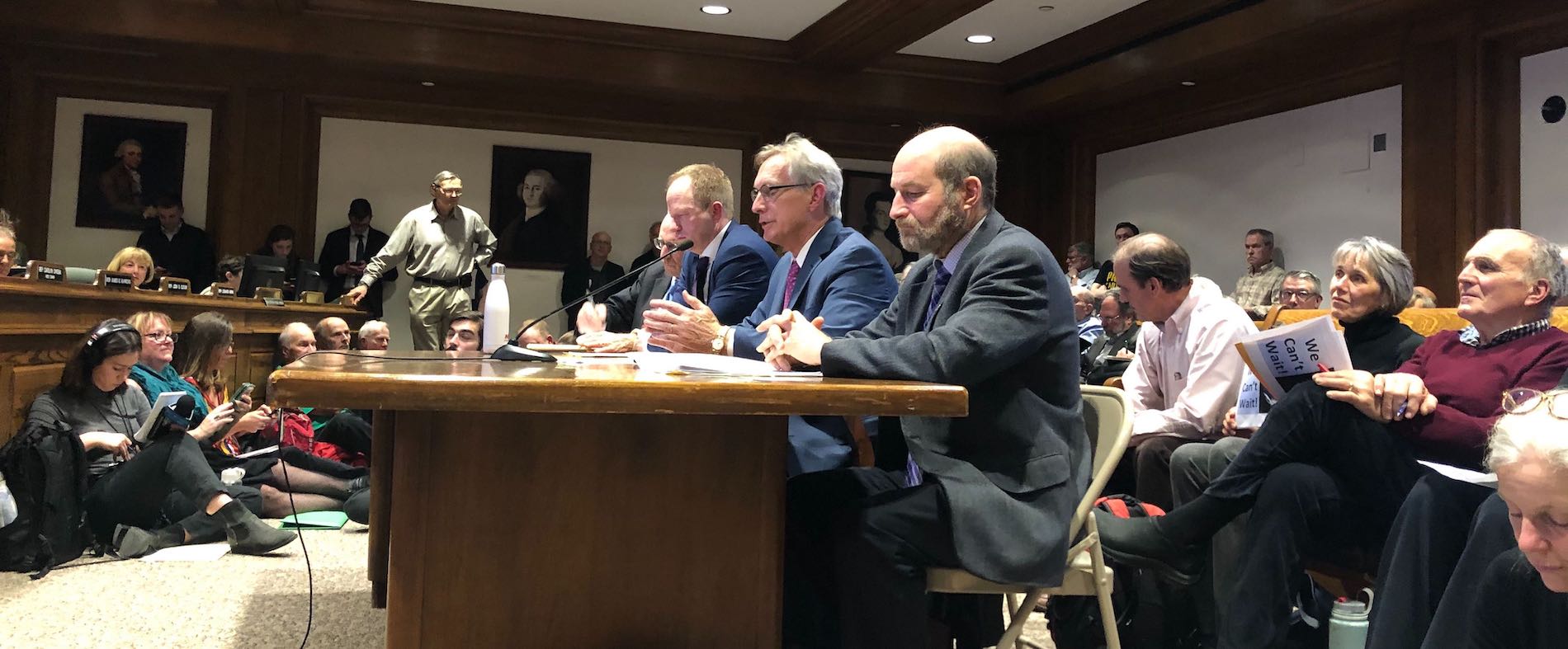
Youth climate activists from Our Climate and Sunrise wrapped up the hearing with hard-hitting testimony about the climate impacts they are most concerned about. Drawing upon the educational sacrifice they’re making today to fight for their future and the future of generations to come. In an especially memorable moment, one speaker recalled how she testified at a similar hearing two years ago and was ashamed that she had to be there again because legislators hadn’t done their job and passed a price on carbon into law.
What’s next
The hearing, which generated a ton of buzz on Beacon Hill, has set the tone for the rest of the session. For the near future, all eyes will be on the Senate, which is expected to release its forthcoming climate bill in the coming weeks. After the release, expect a flurry of activity, similar to what we saw last session with the clean energy omnibus bill, with groups pushing for changes in the bill and lobbying their Senators to support it.
Meanwhile, House leaders are likely to feel renewed pressure to put a carbon pricing bill to a vote of the full House. This could be either H.2810 or another popular bill under consideration, the 2050 Roadmap Bill filed by Representative Joan Meschino (D-Hull), which includes language for a price on carbon. Similar to the Senate, once either bill is scheduled for a vote on the floor of the House, expect intense lobbying and even more attention
An intermediate goal of the carbon pricing coalition is for both chambers to pass some type of carbon price, and for the two bills to be brought together in a conference committee. The committee, which includes lawmakers from both chambers, would then negotiate the differences and come up with a final bill that is then sent to the Governor. The legislature still has until July 31st, 2020 to pass a carbon pricing bill in this way.
This week’s hearing represents the very successful completion of one of what will be plenty of steps between now and the end of July. If the grassroots energy displayed at the hearing continues throughout the rest of the process, and there is no indication that it won’t, then Massachusetts has a very good chance of making history by passing a carbon price.

